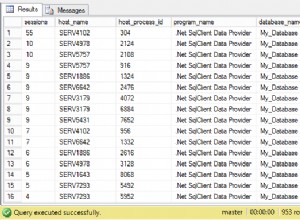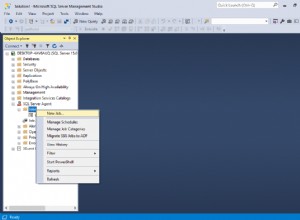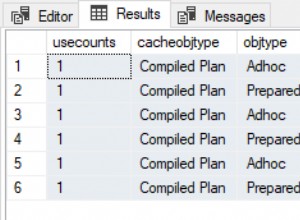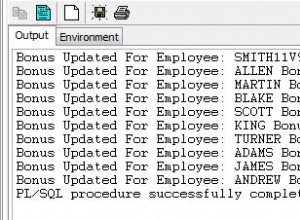Vous configurez chaque poignée cURL de la même manière, puis les ajoutez à un curl_multi_ manipuler. Les fonctions à regarder sont les curl_multi_* fonctions documentées ici
. D'après mon expérience, cependant, il y avait des problèmes pour essayer de charger trop d'URL à la fois (bien que je ne puisse pas trouver mes notes à ce sujet pour le moment), donc la dernière fois que j'ai utilisé curl_mutli_ , je l'ai configuré pour faire des lots de 5 URL à la fois.
modifier :Voici une version réduite du code que j'ai en utilisant curl_multi_ :
modifier :Légèrement réécrit et beaucoup de commentaires ajoutés, ce qui, espérons-le, aidera.
// -- create all the individual cURL handles and set their options
$curl_handles = array();
foreach ($urls as $url) {
$curl_handles[$url] = curl_init();
curl_setopt($curl_handles[$url], CURLOPT_URL, $url);
// set other curl options here
}
// -- start going through the cURL handles and running them
$curl_multi_handle = curl_multi_init();
$i = 0; // count where we are in the list so we can break up the runs into smaller blocks
$block = array(); // to accumulate the curl_handles for each group we'll run simultaneously
foreach ($curl_handles as $a_curl_handle) {
$i++; // increment the position-counter
// add the handle to the curl_multi_handle and to our tracking "block"
curl_multi_add_handle($curl_multi_handle, $a_curl_handle);
$block[] = $a_curl_handle;
// -- check to see if we've got a "full block" to run or if we're at the end of out list of handles
if (($i % BLOCK_SIZE == 0) or ($i == count($curl_handles))) {
// -- run the block
$running = NULL;
do {
// track the previous loop's number of handles still running so we can tell if it changes
$running_before = $running;
// run the block or check on the running block and get the number of sites still running in $running
curl_multi_exec($curl_multi_handle, $running);
// if the number of sites still running changed, print out a message with the number of sites that are still running.
if ($running != $running_before) {
echo("Waiting for $running sites to finish...\n");
}
} while ($running > 0);
// -- once the number still running is 0, curl_multi_ is done, so check the results
foreach ($block as $handle) {
// HTTP response code
$code = curl_getinfo($handle, CURLINFO_HTTP_CODE);
// cURL error number
$curl_errno = curl_errno($handle);
// cURL error message
$curl_error = curl_error($handle);
// output if there was an error
if ($curl_error) {
echo(" *** cURL error: ($curl_errno) $curl_error\n");
}
// remove the (used) handle from the curl_multi_handle
curl_multi_remove_handle($curl_multi_handle, $handle);
}
// reset the block to empty, since we've run its curl_handles
$block = array();
}
}
// close the curl_multi_handle once we're done
curl_multi_close($curl_multi_handle);
Étant donné que vous n'avez besoin de rien en retour des URL, vous n'avez probablement pas besoin de beaucoup de ce qui s'y trouve, mais c'est ainsi que j'ai divisé les requêtes en blocs de BLOCK_SIZE , a attendu que chaque bloc s'exécute avant de continuer et a détecté des erreurs de cURL.




